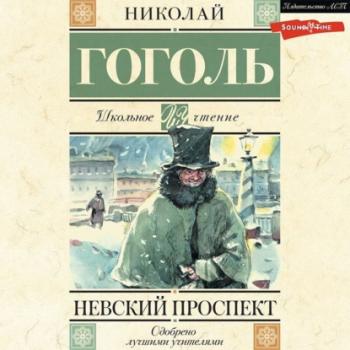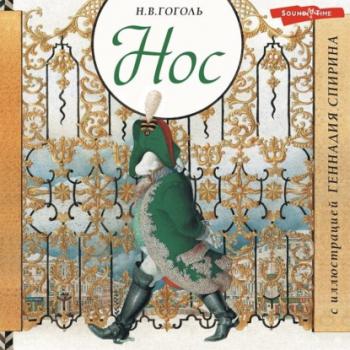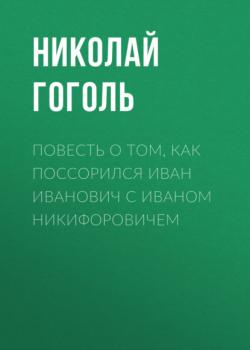Николай Гоголь
Список книг автора Николай ГогольШинель
Знаменитая повесть автора в аудиоформате! "Шинель", «Нос», «Невский проспект» и другие «Петербургские повести» Гоголя до сих пор поражают читателя своим смысловым разнообразием. Реализм в них тесно переплетается с фантастикой, трагизм с озорным юмором. Эти повести по сей день читаются с неизменным интересом. Также в сборник вошли непревзойденные шедевры мировой драматургии – комедии «Ревизор» и «Женитьба». В них Гоголь заставил современников смеяться над тем, к чему привыкли и что перестали замечать. © Оформление. ООО "Издательство «АСТ», 2013
Невский проспект
Повесть из сборника “Шинель” "Шинель", «Нос», «Невский проспект» и другие «Петербургские повести» Гоголя до сих пор поражают читателя своим смысловым разнообразием. Реализм в них тесно переплетается с фантастикой, трагизм с озорным юмором. Эти повести по сей день читаются с неизменным интересом. Также в сборник вошли непревзой-денные шедевры мировой драматургии – комедии «Ревизор» и «Женитьба». В них Гоголь заставил современников смеяться над тем, к чему привыкли и что пере-стали замечать. © Оформление. ООО "Издательство «АСТ», 2013
Нос
Знаменитая классика в новом звучании! "Шинель", «Нос», «Невский проспект» и другие «Петербургские повести» Гоголя до сих пор поражают читателя своим смысловым разнообразием. Реализм в них тесно переплетается с фантастикой, трагизм с озорным юмором. Эти повести по сей день читаются с неизменным интересом. Также в сборник вошли непревзойденные шедевры мировой драматургии – комедии «Ревизор» и «Женитьба». В них Гоголь заставил современников смеяться над тем, к чему привыкли и что перестали замечать. © Оформление ООО «Издательство АСТ», 2013
Мертвые души. Поэма
Гоголь ощущал себя национальным писателем, которому предстоит встать рядом с его кумиром Пушкиным и создать труд, который поставит его имя в первый ряд русских писателей. И трудом этим стала поэма «Мертвые души». Историк и цензор, пропустивший в печать «Мертвые души», А. В. Никитенко писал Гоголю 1 апреля 1842 года: «Не могу удержаться, чтоб не сказать вам несколько сердечных слов, а сердечные эти слова не иное что, как изъяснение восторга к вашему превосходному творению. Какой глубокий взгляд в самые недра нашей жизни! Какая прелесть неподдельного, вам одним свойственного комизма! Что за юмор! Какая мастерская, рельефная, меткая обрисовка характеров!» Ни один просвещенный человек в России не остался равнодушен к новому произведению Гоголя, книга всех тронула, никого не оставила равнодушным. Да и в современной России нетрудно найти гоголевских персонажей. Книга содержит 104 рисунка Александра Агина (1817–1875), которые признаны лучшими иллюстрациями к «Мертвым душам». В формате a4.pdf сохранен издательский макет.
Повесть о том, как поссорился Иван Иванович с Иваном Никифоровичем
«Прекрасный человек Иван Иванович! Какой у него дом в Миргороде! Вокруг него со всех сторон навес на дубовых столбах, под навесом везде скамейки. Иван Иванович, когда сделается слишком жарко, скинет с себя и бекешу и исподнее, сам останется в одной рубашке и отдыхает под навесом и глядит, что делается во дворе и на улице. Какие у него яблони и груши под самыми окнами! Отворите только окно – так ветви и врываются в комнату. Это все перед домом; а посмотрели бы, что у него в саду! Чего там нет! Сливы, вишни, черешни, огородина всякая, подсолнечники, огурцы, дыни, стручья, даже гумно и кузница…»
Тарас Бульба. Повести из цикла «Миргород»
В настоящей книге публикуются две повести Н. В. Гоголя («Тарас Бульба» и «Вий») из цикла «Миргород», который автор задумывал, как известно, как продолжение «Вечеров на хуторе близ Диканьки», предполагая и дальше знакомить читателей с жизнью и бытом малороссийских крестьян, казаков и мелких помещиков. От веселых и романтических парубков и дивчин, вдохновенно-поэтических описаний украинской природы Гоголь перешел к изображению прозы жизни. Подготавливая материал для повести «Тарас Бульба», писатель по крупицам собирал исторические эпизоды, включая информацию из личных архивов и необнародованных источников. При этом, выкладывая мозаику истории Украины, классик разбил сухие факты народным фольклором, искусно смешал исторические факты и художественный вымысел. «Вий» – повесть об испытании духовной стойкости перед лицом враждебных, темных сил мира. Стоило Хоме усомниться в себе, как он забыл все свои заклятия и молитвы и погиб… Фантастическая, но весьма поучительная история.









